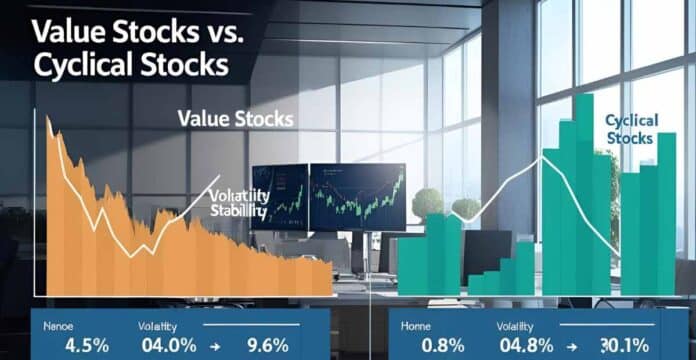Value stocks have long been favored by investors seeking stable returns and undervalued opportunities in the market. But a common question arises: Are value stocks cyclical? Understanding this concept is crucial for making informed investment decisions, particularly when navigating economic cycles.
Cyclicality in investing refers to how certain stocks move in response to economic expansions and contractions. Some stocks thrive in growth periods, while others perform better during downturns. The debate around value stocks and their cyclicality stems from their price movements relative to economic shifts. In this article, we’ll break down the relationship between value stocks and economic cycles, examining whether they truly behave like cyclical stocks.
What Are Value Stocks?
Value stocks are shares of companies that trade at a lower price relative to their fundamentals, such as earnings, book value, or dividends. These stocks are typically found in mature industries, offering stable revenue streams and consistent profitability.
Key Characteristics of Value Stocks:
- Low price-to-earnings (P/E) ratio
- High dividend yields
- Strong balance sheets
- Consistent cash flows
- Often underpriced due to market pessimism
Value vs. Growth Stocks:
| Feature | Value Stocks | Growth Stocks |
|---|---|---|
| Price | Undervalued | High valuation |
| Dividend Yield | Often high | Usually low |
| Risk | Moderate to low | Higher volatility |
| Industry | Mature sectors | Emerging or high-growth industries |
Examples of Value Stocks:
- Banking and Financial Services – JPMorgan Chase, Bank of America
- Consumer Goods – Procter & Gamble, Coca-Cola
- Energy – ExxonMobil, Chevron
Value stocks differ significantly from growth stocks, which focus on potential future earnings rather than present valuations. But do these value stocks follow cyclical patterns?
Understanding Cyclicality in Investing
To determine if value stocks are cyclical, we must first understand what cyclicality means in investing.
Cyclical vs. Non-Cyclical Stocks:
- Cyclical Stocks: Move with the economy, performing well in expansions and struggling in recessions. Examples include auto manufacturers, travel, and luxury goods.
- Non-Cyclical (Defensive) Stocks: Remain stable regardless of economic conditions. Examples include utilities, healthcare, and consumer staples.
Impact of Economic Cycles on Stock Prices:
Stock prices are influenced by macroeconomic conditions. In periods of strong GDP growth, cyclical stocks outperform. However, during downturns, defensive stocks become safer bets.
So, where do value stocks fit into this spectrum?
Are Value Stocks Cyclical?
The short answer: Some value stocks are cyclical, but not all.
Historical Trends of Value Stocks:
- Many value stocks belong to cyclical industries like financials, industrials, and energy, meaning their prices fluctuate with economic cycles.
- However, some value stocks in defensive industries (e.g., healthcare, utilities) remain stable.
Relationship Between Economic Cycles and Value Stocks:
- Expansion: Value stocks in cyclical industries rise as demand increases.
- Recession: Defensive value stocks hold steady or outperform.
Comparison with Cyclical and Defensive Stocks:
| Stock Type | Economic Performance |
|---|---|
| Cyclical Stocks | Rise in growth, fall in downturns |
| Defensive Stocks | Stable across all cycles |
| Value Stocks | Can be cyclical or defensive |
Thus, while some value stocks move in line with economic cycles, others remain resilient, making them a mix of both.
Factors Affecting the Cyclicality of Value Stocks
Not all value stocks are created equal. Several factors influence their cyclicality:
1. Industry and Sector Classification:
- Cyclical Value Stocks: Found in financials, energy, and industrials.
- Defensive Value Stocks: Common in consumer staples, utilities, and healthcare.
2. Interest Rates and Monetary Policy:
- Rising interest rates often boost value stocks as they perform better in high-yield environments.
- Falling rates may benefit growth stocks instead.
3. Inflation and Macroeconomic Trends:
- Value stocks in energy and commodities may outperform during inflationary periods.
- Defensive stocks tend to hold steady during downturns.
Since value stocks don’t fit neatly into one category, investors should analyze industry trends before investing.
Value Stocks vs. Cyclical Stocks
Many investors confuse value stocks with cyclical stocks, but they are not the same. While some value stocks exhibit cyclical behavior, others remain more stable across economic cycles.
Key Differences Between Value Stocks and Cyclical Stocks
| Feature | Value Stocks | Cyclical Stocks |
|---|---|---|
| Definition | Stocks trading below their intrinsic value | Stocks whose prices fluctuate with economic cycles |
| Risk | Moderate to low | High during recessions, low during expansions |
| Industries | Found in various sectors (financials, energy, consumer goods) | Primarily in consumer discretionary, industrials, and commodities |
| Dividend Yield | Often high | Varies, depending on the company |
Are All Value Stocks Cyclical?
No. While many value stocks are cyclical, not all fall into this category. Some value stocks belong to defensive industries that perform well regardless of economic conditions. For example:
- Cyclical Value Stocks: General Motors, JPMorgan Chase, ExxonMobil
- Defensive Value Stocks: Procter & Gamble, Johnson & Johnson, Coca-Cola
The key takeaway? Not all value stocks are cyclical, but many are affected by economic cycles.
How Economic Cycles Impact Value Stocks
Economic cycles play a crucial role in determining how value stocks perform. Let’s break it down:
1. Expansion Phase (Economic Growth)
- Businesses and consumers spend more, increasing corporate profits.
- Cyclical value stocks, such as financials and industrials, perform well.
- Investors favor growth stocks over value stocks due to higher expected returns.
2. Peak Phase (Boom Before a Downturn)
- Inflation may rise, leading to higher interest rates.
- Value stocks may gain favor as investors look for stability.
- Dividend-paying value stocks become attractive as bond yields rise.
3. Recession Phase (Economic Decline)
- Cyclical value stocks (e.g., banks, energy) suffer due to reduced consumer spending.
- Defensive value stocks (e.g., consumer staples, healthcare) remain stable or even gain value.
4. Recovery Phase (Market Rebounds)
- Value stocks tend to recover before growth stocks as investors seek undervalued opportunities.
- Strong balance sheets and dividends make value stocks attractive.
Historically, value stocks have performed well during recoveries and high-interest-rate environments, whereas growth stocks dominate during booms and low-interest-rate periods.
8. Defensive Value Stocks vs. Cyclical Value Stocks
Not all value stocks move with the economic cycle. Let’s break them into two categories:
1. Defensive Value Stocks (Less Cyclical)
- Companies in industries with stable demand, such as healthcare, utilities, and consumer staples.
- Continue generating revenue even during economic downturns.
- Examples: Procter & Gamble, Johnson & Johnson, Duke Energy.
2. Cyclical Value Stocks
- Companies whose earnings fluctuate with economic cycles.
- Often found in industrials, energy, and finance.
- Examples: Ford, JPMorgan Chase, Caterpillar.
Knowing which type of value stock you’re investing in is crucial for risk management.
9. Investing Strategies for Value Stocks
Now that we understand value stock cyclicality, let’s discuss investment strategies.
1. Diversification is Key
- A well-balanced portfolio should include both defensive and cyclical value stocks.
- This helps minimize risk during economic downturns.
2. Buy During Market Downturns
- Historically, value stocks become undervalued during bear markets, presenting buying opportunities.
- Look for strong fundamentals—low P/E ratios, high dividends, and stable cash flow.
3. Consider Interest Rates and Inflation
- Value stocks tend to outperform when interest rates are rising, as growth stocks struggle with higher borrowing costs.
- Investing in sectors like energy, commodities, and financials can help hedge against inflation.
4. Focus on Dividend-Paying Value Stocks
- Companies that pay dividends provide income and stability during uncertain times.
- Stocks like Coca-Cola and Procter & Gamble have consistently paid dividends through recessions.
By applying these strategies, investors can reduce risk and capitalize on economic cycles.
10. Value Investing in Different Market Conditions
How Value Stocks Perform in a Bull Market
- Growth stocks often outperform in bull markets.
- However, high-quality value stocks still appreciate as investors seek undervalued opportunities.
How Value Stocks Perform in a Bear Market
- Defensive value stocks often outperform growth stocks during market downturns.
- Investors shift towards safe-haven assets like dividend stocks and blue-chip companies.
Historical Data on Value Stock Performance
| Market Condition | Value Stocks Performance |
|---|---|
| Economic Growth | Moderate gains, but underperform growth stocks |
| Market Crash | Decline, but typically less than growth stocks |
| Economic Recovery | Strong gains, often outperform growth stocks |
| High Inflation | Outperform due to pricing power and dividends |
Understanding these patterns helps investors time their value stock purchases effectively.
11. The Role of Interest Rates and Inflation
Interest rates and inflation have a significant impact on value stock performance.
How Rising Interest Rates Affect Value Stocks
- Value stocks, especially financials and energy, tend to perform better when rates rise.
- Growth stocks struggle due to increased borrowing costs.
How Inflation Impacts Value Stocks
- Companies in industries with strong pricing power (e.g., consumer staples, energy) can pass inflation costs to consumers.
- Defensive value stocks remain stable, while cyclical value stocks may decline if inflation slows economic growth.
Strategies to Hedge Against Inflation
- Invest in energy stocks, financials, and consumer staples.
- Focus on high-dividend stocks with strong earnings potential.
By monitoring interest rates and inflation trends, investors can make better value stock selections.
12. Sector Analysis: Where Do Value Stocks Fit?
Value stocks exist across multiple sectors, but some are more cyclical than others.
Sectors with Cyclical Value Stocks
- Financials: Banks and insurance companies (e.g., JPMorgan, Wells Fargo).
- Industrials: Construction and manufacturing firms (e.g., Caterpillar).
- Energy: Oil and gas companies (e.g., ExxonMobil).
Sectors with Defensive Value Stocks
- Healthcare: Pharmaceutical and medical firms (e.g., Johnson & Johnson).
- Consumer Staples: Household goods and food companies (e.g., Procter & Gamble).
- Utilities: Electricity and water providers (e.g., Duke Energy).
Knowing which sector a value stock belongs to helps predict its performance during economic shifts.
13. Should You Invest in Value Stocks During a Recession?
Pros of Buying Value Stocks in a Recession
✅ Stocks become undervalued, presenting long-term opportunities.
✅ Defensive value stocks provide stability and dividends.
✅ Historically, value stocks recover well post-recession.
Cons of Buying Value Stocks in a Recession
❌ Cyclical value stocks (e.g., industrials, financials) may decline further.
❌ Market timing is difficult—stocks can stay undervalued for extended periods.
14. Conclusion
So, are value stocks cyclical? Some are, but not all.
- Many value stocks in cyclical industries (e.g., financials, energy) move with the economic cycle.
- However, defensive value stocks (e.g., healthcare, consumer staples) remain stable.
- Investing in value stocks requires understanding economic trends, interest rates, and sector performance.
By combining defensive and cyclical value stocks, investors can create a balanced portfolio that weathers all market conditions.
15. FAQs
1. Are value stocks always cyclical?
No. Some value stocks, like consumer staples and utilities, are defensive and not cyclical.
2. Which industries have the most cyclical value stocks?
Financials, energy, and industrials tend to be the most cyclical.
3. Do value stocks perform better than growth stocks in recessions?
Generally, yes—especially defensive value stocks.
4. Is value investing still relevant today?
Yes! Value stocks continue to offer long-term returns and stability.
5. What are the risks of investing in value stocks?
The biggest risks include economic downturns affecting cyclical stocks and long periods of undervaluation.

A writer, editor, and publisher with a knack for crafting informative articles.

